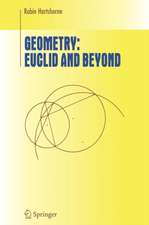Physics of Fractal Operators: Institute for Nonlinear Science
Autor Bruce West, Mauro Bologna, Paolo Grigolinien Limba Engleză Hardback – 14 ian 2003
| Toate formatele și edițiile | Preț | Express |
|---|---|---|
| Paperback (1) | 392.37 lei 6-8 săpt. | |
| Springer – 26 mai 2011 | 392.37 lei 6-8 săpt. | |
| Hardback (1) | 397.38 lei 6-8 săpt. | |
| Springer – 14 ian 2003 | 397.38 lei 6-8 săpt. |
Preț: 397.38 lei
Nou
Puncte Express: 596
Preț estimativ în valută:
76.04€ • 81.31$ • 63.40£
76.04€ • 81.31$ • 63.40£
Carte tipărită la comandă
Livrare economică 18 aprilie-02 mai
Preluare comenzi: 021 569.72.76
Specificații
ISBN-13: 9780387955544
ISBN-10: 0387955542
Pagini: 354
Ilustrații: X, 354 p. 23 illus.
Dimensiuni: 155 x 235 x 20 mm
Greutate: 0.64 kg
Ediția:2003
Editura: Springer
Colecția Springer
Seria Institute for Nonlinear Science
Locul publicării:New York, NY, United States
ISBN-10: 0387955542
Pagini: 354
Ilustrații: X, 354 p. 23 illus.
Dimensiuni: 155 x 235 x 20 mm
Greutate: 0.64 kg
Ediția:2003
Editura: Springer
Colecția Springer
Seria Institute for Nonlinear Science
Locul publicării:New York, NY, United States
Public țintă
GraduateCuprins
1 Non-differentiable processes.- 1.1 Classical mechanics.- 1.2 Langevin equation.- 1.3 Comments on the physics of the fractional calculus.- 1.4 Commentary.- 2 Failure of traditional models.- 2.1 Fractals; geometric and otherwise.- 2.2 Generalized Weierstrass function.- 2.3 Fractional operators.- 2.4 Intervals of the generalized Weierstrass function.- 2.5 Commentary.- 3 Fractional dynamics.- 3.1 Elementary properties of fractional derivatives.- 3.2 The generalized exponential functions.- 3.3 Parametric derivatives.- 3.4 Commentary.- 4 Fractional Fourier transforms.- 4.1 A brief review of Fourier analysis.- 4.2 Linear fields.- 4.3 Fourier transforms in the fractional calculus.- 4.4 Generalized Fourier transform.- 4.5 Commentary.- 5 Fractional Laplace transforms.- 5.1 Solving differential equations.- 5.2 Generalized exponentials.- 5.3 Fractional Green’s functions.- 5.4 Commentary.- 6 Fractional randomness.- 6.1 Ordinary random walk.- 6.2 Continuous-time random walk.- 6.3 Fractional random walks.- 6.4 Fractal stochastic time series.- 6.5 Evolution of probability densities.- 6.6 Langevin equation with Lévy statistics.- 6.7 Commentary.- 7 Fractional Rheology.- 7.1 History and definitions.- 7.2 Fractional relaxation.- 7.3 Path integrals.- 7.4 Commentary.- 8 Fractional stochastics.- 8.1 Fractional stochastic equations.- 8.2 Memory kernels.- 8.3 The continuous master equation.- 8.4 Back to Langevin.- 9 The ant in the gurge metaphor.- 9.1 Lévy statistics and renormalization.:.- 9.2 An ad hoc derivation.- 9.3 Fractional eigenvalue equation.- 9.4 Fractional stochastic oscillator.- 9.5 Fractional propagation-transport equation.- 9.6 Commentary.- 10 Appendix.- 10.1 Special functions.- 10.2 Fractional derivatives.- 10.3 Mellin transforms.
Recenzii
From the reviews:
"Have you ever wondered about whether one can define differential derivative of non integer order and how useful these fractal derivatives would be? If the answer is yes this is the book to look at. The book is written by physicists with a pragmatic audience in mind. It contains a very thorough and clearly written discussion of the mathematical foundation as well as the applications to important and interesting mathematical and physical problems. All the topics are very main stream and of great general relevance...
"I am glad I got to know this book. I don't know yet whether fractal calculus will be of crucial importance to my own research in statistical mechanics and complex systems. But I got the feeling from this book that this might very well be the case. And if this happens, I now know exactly where to go for a highly readable and thorough introduction to the field. I think the book deserves to be present in mathematics and physics libraries. And I believe many interesting undergraduate and graduate projects in mathematics and its applications can start out from this book."
- UK Nonlinear News
"The book is written by physicists with a pragmatic audience in mind. It contains a very thorough and clearly written discussion of the mathematical foundation as well as the applications to important and interesting mathematical and physical problems. All the topics are very mainstream and of great general relevance. … Obviously, the book is also of great relevance to the researcher who may need to become acquainted with Fractal Calculus … . I am glad I got to know this book." (Henrik Jensen, UK Nonlinear News, February, 2004)
"Physics of Fractal Operators … is a timely introduction that discusses the basics of fractional calculus. ... Physics of Fractal Operators, which actively promotes the use of fractional calculus in physics, may help teachers develop an appropriate curriculum. … the book’sabundance of material makes it very useful to researchers working in the field of complex systems and stochastic processes. It should help those who want to teach fractional calculus and it will definitely motivate those who want to learn … ." (Igor M. Sokolov, Physics Today, December, 2003)
"The main merit of this well-written book is that it brings out rather clearly the relevance of the fractional calculus leading to the fractal operators and fractal functions. … Each chapter contains an extensive list of relevant references. … The overall style of presentation of the material covered in this book makes it rather useful for physicists and applied mathematicians carrying out a self-study of the fractal calculus and its applications." (Suresh V. Lawande, Mathematical Reviews, 2004 h)
"‘Physics of Fractal Operators’ is one of the great ideas books of our time. It may well become one of the most influential books with the paradigm of using fractional calculus to describe systems with emerging and evolving fractal complexities becoming widely used across the sciences. This important book should be mandatory reading for all PhD students in physics, and it should be at the side of all scientists working with fractals and complexity." (B I Henry, The Physicist, Vol. 40 (5), 2003)
"This book introduces the reader to the interesting mathematical notion of fractal operators and its usefulness to physics. … a comprehensive, well written introduction to the subject … useful to researchers and teachers alike. It is indeed targeted towards a wide, non specialist audience and provides the mathematical basis of fractional calculus … . This book offers a lot of high-quality material to learn from and was definitely a very interesting and enjoyable read for me." (Yves Caudano, Physicalia, Vol. 28 (4-6), 2006)
"Have you ever wondered about whether one can define differential derivative of non integer order and how useful these fractal derivatives would be? If the answer is yes this is the book to look at. The book is written by physicists with a pragmatic audience in mind. It contains a very thorough and clearly written discussion of the mathematical foundation as well as the applications to important and interesting mathematical and physical problems. All the topics are very main stream and of great general relevance...
"I am glad I got to know this book. I don't know yet whether fractal calculus will be of crucial importance to my own research in statistical mechanics and complex systems. But I got the feeling from this book that this might very well be the case. And if this happens, I now know exactly where to go for a highly readable and thorough introduction to the field. I think the book deserves to be present in mathematics and physics libraries. And I believe many interesting undergraduate and graduate projects in mathematics and its applications can start out from this book."
- UK Nonlinear News
"The book is written by physicists with a pragmatic audience in mind. It contains a very thorough and clearly written discussion of the mathematical foundation as well as the applications to important and interesting mathematical and physical problems. All the topics are very mainstream and of great general relevance. … Obviously, the book is also of great relevance to the researcher who may need to become acquainted with Fractal Calculus … . I am glad I got to know this book." (Henrik Jensen, UK Nonlinear News, February, 2004)
"Physics of Fractal Operators … is a timely introduction that discusses the basics of fractional calculus. ... Physics of Fractal Operators, which actively promotes the use of fractional calculus in physics, may help teachers develop an appropriate curriculum. … the book’sabundance of material makes it very useful to researchers working in the field of complex systems and stochastic processes. It should help those who want to teach fractional calculus and it will definitely motivate those who want to learn … ." (Igor M. Sokolov, Physics Today, December, 2003)
"The main merit of this well-written book is that it brings out rather clearly the relevance of the fractional calculus leading to the fractal operators and fractal functions. … Each chapter contains an extensive list of relevant references. … The overall style of presentation of the material covered in this book makes it rather useful for physicists and applied mathematicians carrying out a self-study of the fractal calculus and its applications." (Suresh V. Lawande, Mathematical Reviews, 2004 h)
"‘Physics of Fractal Operators’ is one of the great ideas books of our time. It may well become one of the most influential books with the paradigm of using fractional calculus to describe systems with emerging and evolving fractal complexities becoming widely used across the sciences. This important book should be mandatory reading for all PhD students in physics, and it should be at the side of all scientists working with fractals and complexity." (B I Henry, The Physicist, Vol. 40 (5), 2003)
"This book introduces the reader to the interesting mathematical notion of fractal operators and its usefulness to physics. … a comprehensive, well written introduction to the subject … useful to researchers and teachers alike. It is indeed targeted towards a wide, non specialist audience and provides the mathematical basis of fractional calculus … . This book offers a lot of high-quality material to learn from and was definitely a very interesting and enjoyable read for me." (Yves Caudano, Physicalia, Vol. 28 (4-6), 2006)



















